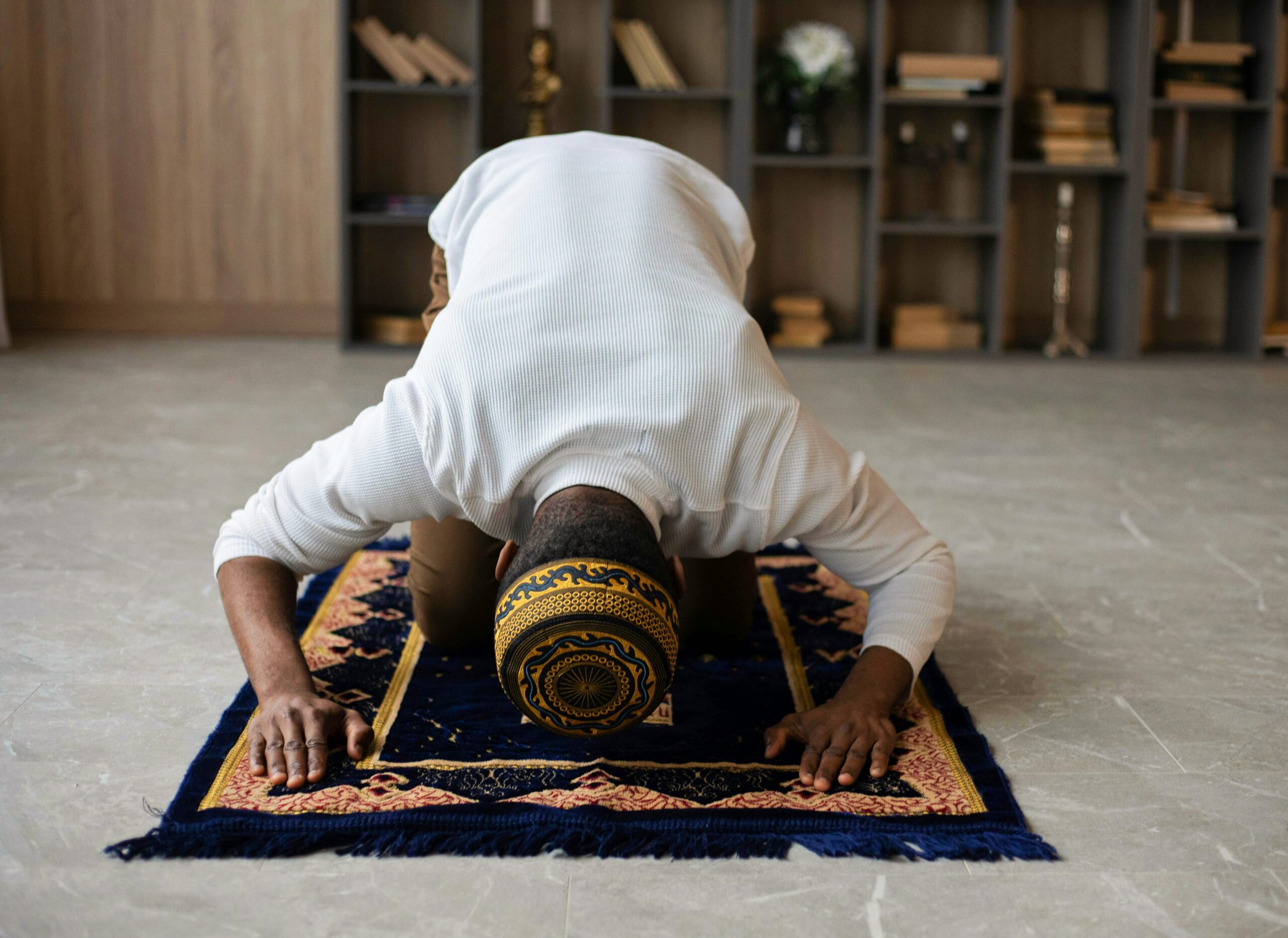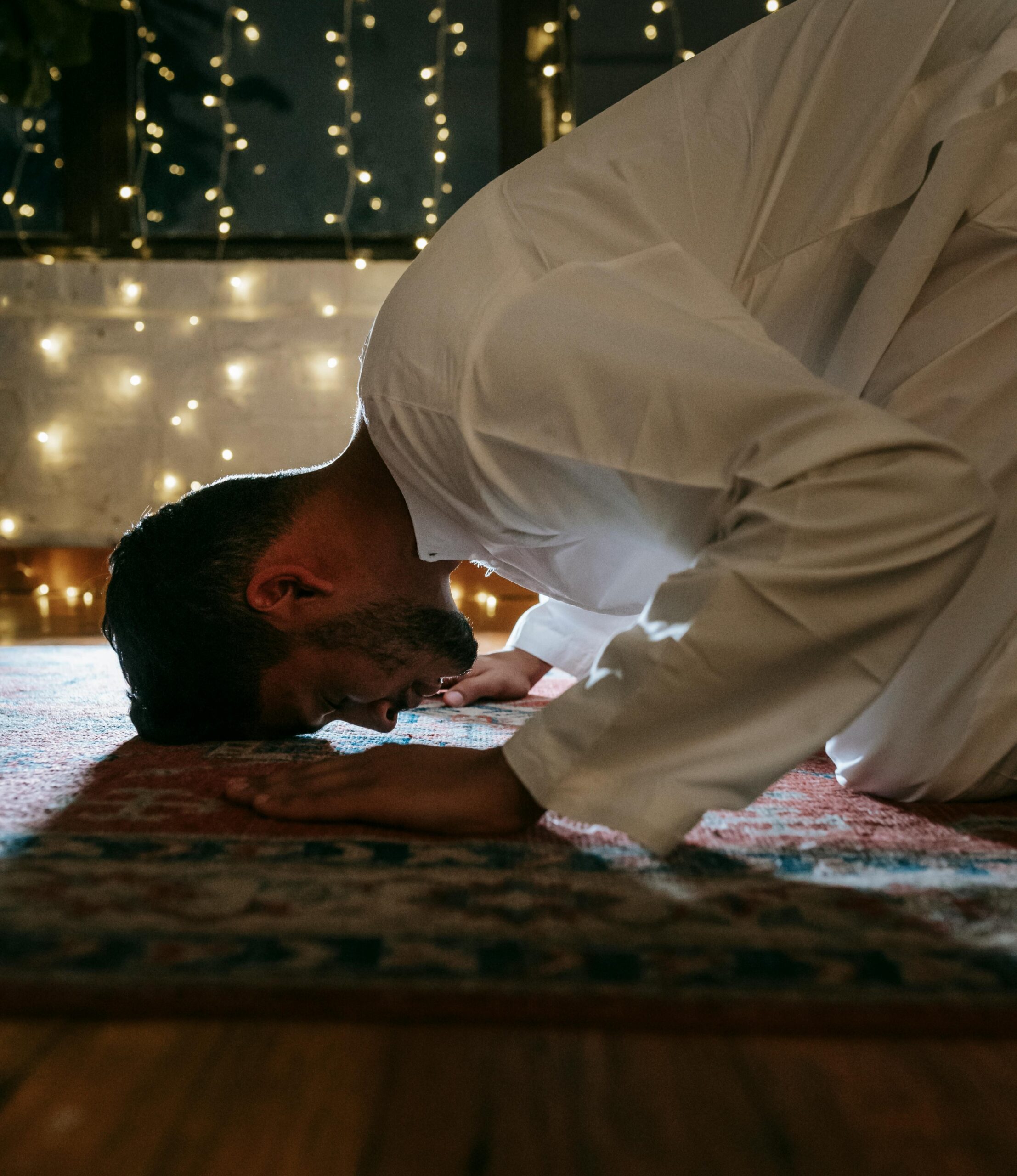There are many questions that many Arab and non-Arab Muslims ask during prayer, including what do you say in sujood? All Muslims know that the Obligatory pillars of prayer are standing before Allah, Ruku, and most importantly, sujood, as humility comes in prayer during Sujood because the Prayers gets closer to his Lord and calls upon Him with all that is within him. Therefore, in this article, we will clarify what is narrated from the Prophet, PBUH, during Sujood.
What can you recite during Sujud?
It is obligatory in Sujood to say “Subhana Rabbiyal A’la” which means (Glory be to my Lord, the Most High) once, and it is Sunnah to say it three times or more, and this is the most correct of the scholars’ opinions. It is recommended with Ruku and Sujood that the Muslim supplicate with a supplication that the Prophet, PBUH, used to say, which is:
BOOK FREE SESSION
سبحانك اللهم ربنا وبحمدك اللهم اغفر لي
Subhanaka Allahumma Rabbana wa bihamdika, Allahumma ighfir lee
“Glory be to You, O Allah, our Lord, and praise be to You. O Allah, forgive me.”
It is recommended for men and women alike to say this supplication in Ruku and Sujood. It is also recommended in Sujood for the Muslim to supplicate and increase in supplication.
It is preferable for a Muslim when praying in Ramadan and at other times to say in Ruku and Sujood:
(سبوح قدوس رب الملائكة والروح سبحان ذي الجبروت والملكوت والكبرياء والعظمة)
Subbuhun Quddoosun Rabbul Malaikati war-Rooh, Subhana Dhil Jabarooti wal Malakooti wal Kibriyaa’i wal ‘Azamah
“Perfect and Most Holy (is He), Lord of the angels and the Spirit. Glory be to the Possessor of might, dominion, grandeur and majesty.”
And if you are wondering whether it is obligatory to supplicate during Sujood, then the answer to that is the saying of the Messenger, PBUH:
“أقرب ما يكون العبد من ربه وهو ساجد فأكثروا الدعاء”
“The closest a servant comes to their Lord is while they are prostrating, so make abundant supplication.”
BOOK FREE SESSION
What language can you recite in during the Sujud?

Saying “Subhana Rabbiyal A’la” in Sujood in a language other than Arabic in prayer is a matter of disagreement among Scholars. Some of them have forbidden it, some have disliked it, and some have permitted it for those who are unable to pronounce the Arabic language. Some scholars believe that supplication in a language other than Arabic is disliked because Omar, may Allah be pleased with him, forbade the “ratana” of the non-Arabs, and “ratan” in the dictionary is speaking in a non-Arabic language.
As for some scholars, they forbid supplication in a language other than Arabic because the non-Arabic in supplication is excessive in glorification, and also supplication in a language other than Arabic contradicts the glory of the Lordship.
It is permissible to supplicate in a language other than Arabic in prayer according to each person’s language, and this is in the event that it is difficult for him to learn the Arabic language only, so he can supplicate with whatever he wants of the good of this world and the Hereafter, and it is not stipulated that this supplication be limited, and Allah knows best.
Some may wonder: did jesus pray like muslims? The answer is that the prayer of Jesus is similar in some aspects to the prayer of Muslims, and the most prominent of these aspects is Sujood.
BOOK FREE SESSION
Dua between two Sujoods in English and in Arabic.
What was narrated from the Prophet, PBUH, in the supplication between the two Sujoods is his saying:
(رب اغفر لي، رب اغفر لي، اللهم اغفر لي، وارحمني، واهدني، واجبرني، وارزقني)
Rabbi ighfir lee, Rabbi ighfir lee, Allahumma ighfir lee, warhamnee, wahdinee, wajburnee, warzuqnee
“My Lord, forgive me, my Lord, forgive me, O Allah, forgive me, have mercy on me, guide me, restore me, and grant me sustenance.”
Some ask: How to Read Quran in 30 Days? The answer is that you can read a Juz’ every day, dividing this Juz’ into five sections, and each section you read after each of the five daily prayers.
Is there a specific number of times I should say “Subhana Rabbiyal A’la”?
The obligatory in Sujood is saying “Subhana Rabbiyal A’la” once, but it is Sunnah to repeat it three times, as this is the best and most excellent, and it is the minimum of perfection. If the Muslim increases more than three times by saying “Subhana Rabbiyal A’la” four, five, six, or more times, it is recommended, as it has been proven from the Prophet, PBUH, what indicates that he counts ten for him in his Sujood and Ruku.
Some Muslim women wonder about tasbeeh to recite during menstruation, and the truth is that a menstruating woman is prescribed what other people are prescribed of takbir, tasbeeh (glorifying Allah), supplication, and seeking forgiveness by heart and tongue.
What if I forget to say something during Sujood?
If the Muslim forgets an obligation of prayer, it is waived from him and he is not obligated to perform it, such as saying “Subhana Rabbiyal A’la” in Sujood, or forgetting “Subhana Rabbiyal Azeem” in Ruku, or forgetting the takbir when bowing, or other such things.
As for the pillars, which are the obligatory parts, if something is forgotten from them, it must be performed and then he follows the Imam, such as forgetting Ruku, it is necessary to return to Ruku again, and then raise and follow the Imam.
BOOK FREE SESSION
What is the significance of Sujood in prayer?

The importance of Sujood in prayer is that Allah raises a degree with it and removes a sin with it, as the Prophet, PBUH, said:
(عليك بكثرة السجود لله، فإنك لا تسجد لله سجدة إلا رفعك الله بها درجة، وحط عنك بها خطيئة)
“You must prostrate much to Allah, for you will not prostrate to Allah a Sujood except that Allah will raise you a degree by it, and remove a sin from you by it.”
And in another Hadith:
(أسألك مرافقتك في الجنة، قال: أو غير ذلك؟ قال: هو ذلك، قال: فأعني على نفسك بكثرة السجود)
“I ask You for your companionship in Paradise.” He said, “Or something else?” He said, “That is it.” He said, “Then help me against myself by prostrating much.”
This is an encouragement to increase Sujood, and the encouragement, and what is meant by it is Sujood in prayer.
Some may wonder: why do muslim face east while praying? The answer is that Muslims face the Holy Kaaba, which is the Qibla (direction of prayer) of their father Ibrahim, peace be upon him.
There are those who wonder: do muslims pray to muhammad? The answer is that Muslims pray to Allah, the One, SWT, and not to Muhammad, PBUH, but pray for Muhammad, PBUH, is a messenger from Allah.
BOOK FREE SESSION
Are there different duas that can be said during Sujood?
There are many supplications narrated during Sujood, including:
(سبحانك اللهم ربنا وبحمدك اللهم اغفر لي)
Subhanaka Allahumma Rabbana wa bihamdika, Allahumma ighfir lee“Glory be to You, O Allah, our Lord, and praise be to You. O Allah, forgive me.”
( سبوح قدوس رب الملائكة والروح )
Subbuhun Quddoosun Rabbul Malaikati war-Rooh“Perfect and Most Holy (is He), Lord of the angels and the Spirit.”
( للهم لك سجدت وبك آمنت ولك أسلمت سجد وجهي للذي خلقه وصوره وشق سمعه وبصره تبارك الله أحسن الخالقين)
Allahumma laka sajadtu, wa bika aamantu, wa laka aslamtu, sajada wajhi lilladhi khalaqahu wa sawwarahu wa shaqqa sam’ahu wa basarahu, tabarak Allahu ahsanul khaliqeen“O Allah, to You I have prostrated, in You I have believed, and to You I have submitted. My face has prostrated to the One who created it, fashioned it, and brought forth its hearing and sight. Blessed is Allah, the best of creators.”
After answering the question of what do you say in sujood in Arabic, it has become clear to us that there are many supplications narrated from the Prophet, PBUH, that Muslims must adhere to the Sunnah of the Prophet. Every Muslim should also increase in supplication during Sujood, especially in the Arabic language, even if the Muslim’s education is in a different language. He must strive and learn Arabic because it is the language of revelation, the language of the Holy Quran, and the language of the people of Paradise.
It is also said to parents: Teach Your Child Islam Quotes from a young age so that it becomes ingrained in their minds when they grow up.
Start Your Journey Today!
Sheikh Saleh Academy consists of a wide range of senior scholars and professors responsible for teaching the Quran, Arabic language and Islamic sciences, as well as the Tajweed, in a smooth and modern style. These are our courses:
BOOK FREE SESSION
- online quran classes
- tajweed quran
- quran memorization program
- quran ijazah online
- online arabic classes
- study islamic studies online
Ready to deepen your understanding of the Qur’an and Arabic? Join our one-on-one online classes with expert teachers today!
